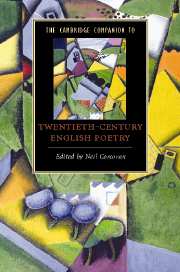Book contents
- Frontmatter
- Introduction
- Part I Contexts
- Part II Moderns
- Part III Modernists
- Part IV Later Modernities
- 10 Philip Larkin: a late modern poet
- 11 R. S. Thomas and modern Welsh poetry
- 12 Gender, feminism, poetry: Stevie Smith, Sylvia Plath, Jo Shapcott
- 13 Varieties of poetic sequence: Ted Hughes and Geoffrey Hill
- 14 Black British poetry and the translocal
- 15 Poetry and class: Tony Harrison, Peter Reading, Ken Smith, Sean O’Brien
- 16 A Scottish Renaissance: Edwin Morgan, Douglas Dunn, Liz Lochhead, Robert Crawford, Don Paterson, Kathleen Jamie
- 17 Lyric adaptations: James Fenton, Craig Raine, Christopher Reid, Simon Armitage, Carol Ann Duffy
- Index
16 - A Scottish Renaissance: Edwin Morgan, Douglas Dunn, Liz Lochhead, Robert Crawford, Don Paterson, Kathleen Jamie
from Part IV - Later Modernities
Published online by Cambridge University Press: 28 January 2008
- Frontmatter
- Introduction
- Part I Contexts
- Part II Moderns
- Part III Modernists
- Part IV Later Modernities
- 10 Philip Larkin: a late modern poet
- 11 R. S. Thomas and modern Welsh poetry
- 12 Gender, feminism, poetry: Stevie Smith, Sylvia Plath, Jo Shapcott
- 13 Varieties of poetic sequence: Ted Hughes and Geoffrey Hill
- 14 Black British poetry and the translocal
- 15 Poetry and class: Tony Harrison, Peter Reading, Ken Smith, Sean O’Brien
- 16 A Scottish Renaissance: Edwin Morgan, Douglas Dunn, Liz Lochhead, Robert Crawford, Don Paterson, Kathleen Jamie
- 17 Lyric adaptations: James Fenton, Craig Raine, Christopher Reid, Simon Armitage, Carol Ann Duffy
- Index
Summary
Let us begin at the end: contemporary poetry ceased to be 'twentieth-century' in December 1999. Throughout the world, the Millennium was a moment for reflection on the expiring century, but in Scotland, especially, it also meant rebirth. In the previous July, the Scottish Parliament had opened in Edinburgh after a recess lasting two hundred and ninety-two years, and its re-establishment confirmed the confidence in Scotland's culture and independent identity that had been growing, albeit fitfully, since the 1960s. The time was right for a new anthology of Scottish poetry, which could present the country 'hale and whole' and provide a literary context for poets working in Scotland at the beginning of the twenty-first century. The New Penguin Book of Scottish Verse, edited by Robert Crawford and Mick Imlah, opens with St Columba's 'Altus Prosatur' ('The Maker on High'). The sixth-century Latin may seem startlingly remote from the experience of modern readers, but on the facing page is the English translation by Edwin Morgan, through whose powerful rhythms the traditional faith in eternal creative energy comes pouring through, breaking down linguistic barriers and opening poetic channels through the centuries. As Morgan has observed in a recent sonnet on Scottish literary tradition,
did you expect woad and spears? In Altus Prosator the bristly blustery land Bursts in buzz and fouth within a grand Music of metrical thought.
- Type
- Chapter
- Information
- The Cambridge Companion to Twentieth-Century English Poetry , pp. 230 - 244Publisher: Cambridge University PressPrint publication year: 2007

